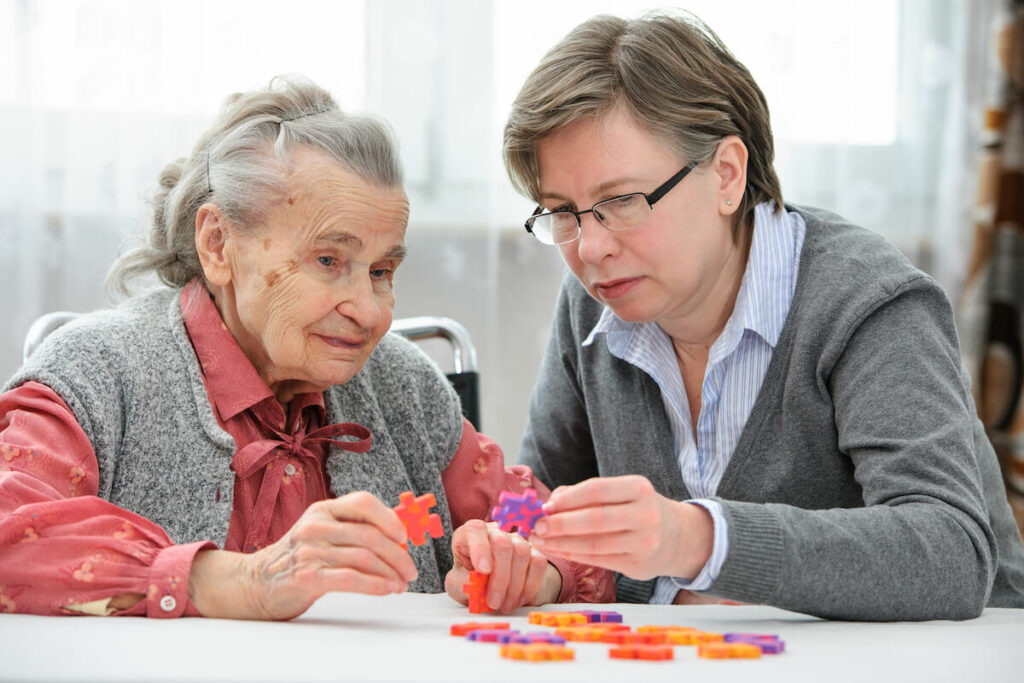The Progression of Dementia and When To Seek Help
As our loved ones age, it’s natural for us to start worrying about their health and well-being. One of the most common concerns is memory loss. After all, who doesn’t forget where they put their keys from time to time?
But what if that forgetfulness starts to interfere with everyday life? That’s when it might be time to start talking about dementia. Contact your family doctor immediately if you suspect a parent or relative is experiencing memory loss.
Dementia is a broad term used to describe a decline in cognitive function. It can affect memory, communication, and reasoning skills. While it is most common in older adults, it is not a normal part of aging.
Consult this blog from the memory care professionals at Dominion Senior Living of Sevierville. Learn more about the stages of dementia, early detection, and when to find help.

What are the seven stages of dementia?
Dementia progresses in seven stages. Each interval has its own set of symptoms. It’s important to remember that everyone experiences dementia differently; not everyone will go through all seven steps. The seven stages are:
1. No impairment
This stage is when there are no signs or symptoms of dementia.
2. Very mild cognitive decline
This stage is also known as pre-dementia. At this stage, people may start to have trouble with things like remembering names or recent events.
3. Mild cognitive decline
This is the first stage at which people start to experience noticeable symptoms. People with mild dementia may struggle with things like planning or solving problems. They may also have trouble with short-term memory and begin to withdraw from social activities.
4. Moderate cognitive decline
Symptoms become more pronounced with moderate dementia. People may struggle with complex tasks like driving or balancing a checkbook. They may also start to experience mood changes and apathy.
5. Moderately severe cognitive decline
People in this stage have trouble with basic tasks like dressing or bathing themselves. They may also confuse time and place and have difficulty understanding conversations.
6. Severe cognitive decline
People lose the ability to communicate and become entirely dependent on others for their care at this stage.
7. End-stage dementia
This stage of dementia is severe. It is characterized by a complete loss of mental and physical function. End-stage dementia makes everyday activities impossible.
Testing For Mild Cognitive Impairment
MCI, or mild cognitive impairment, is a condition that can affect memory, thinking, and other cognitive abilities. While MCI does not always lead to dementia, it is a risk factor. Early detection of MCI is crucial, as it may indicate an underlying health condition.
There are several ways to assess MCI, including neuropsychological testing and brain imaging. Neuropsychological testing can help to identify changes in cognition, while brain imaging can provide clues about the underlying causes of MCI.
Early diagnosis and treatment of MCI may improve long-term outcomes and help to prevent or delay the onset of dementia.
Less than one in five Americans is aware of MCI and its potential to lead to dementia, says the Alzheimer’s Association. One-third of people diagnosed with MCI develop Alzheimer’s within five years.
Alzheimer’s vs. Dementia
It’s important to understand the difference between Alzheimer’s and dementia. They are often used interchangeably, but they are not the same thing.
Alzheimer’s disease is a specific form of dementia that causes:
- Memory impairment
- Problems with thinking and judgment
- Difficulty carrying out daily activities
Dementia is a general term for a decline in mental ability due to disease or injury. Alzheimer’s is the most common form of dementia, accounting for 60-80% of all cases.
While all cases of Alzheimer’s are dementias, not all dementias are Alzheimer’s. There are many other types of dementia, including:
- Lewy body dementia
- Frontotemporal dementia
- Vascular dementia
- Mixed dementia
Each type of dementia has its own causes, symptoms, and prognosis. However, all forms of dementia can lead to problems with memory, thinking, and activities of daily living.
Visit your doctor if you or a loved one is experiencing any of these symptoms. Early diagnosis and treatment can improve quality of life and help manage symptoms.
How to Begin Caring For Someone with Dementia
It may feel overwhelming when a loved one is diagnosed with dementia. While it can be challenging to manage, there are ways to help your loved one receive the best care.
In the early stages of dementia, it is vital to focus on maintaining your loved one’s independence and quality of life. This process may involve making modifications to their home, such as:
- Installing grab bars in the bathroom
- Limiting their exposure to potential hazards
- Removing loose rugs
- Ensuring all areas of your home are well lit
Keep open lines of communication with your loved one and encourage them to express their needs and feelings.
Be patient and understand that they may have difficulty communicating or remembering things. It is also essential to help them stay active and engaged. This step can include taking a walk together, doing puzzles, or talking about old memories.
Provide structure and routine in their day-to-day life. This practice can help reduce anxiety and confusion.
It is crucial to be supportive. Dementia can be difficult to live with and manage. Your loved one will need all the love and support they can get.
When should you consider memory care?
Over 361,000 family members provide Alzheimer’s care in Tennessee. Memory care can help when care goes beyond your physical or emotional limitations.
You should consider memory care when your loved one begins to experience symptoms of dementia that interfere with their daily life. It’s critical to plan for potential care options as early as possible.
Dominion of Sevierville can support seniors and their family members at each stage of dementia. We offer a comprehensive memory care program that includes:
- 24/7 supervision
- Help with everyday tasks like bathing and dressing
- Meals tailored to resident’s needs
- Stimulating activities
- Dementia-friendly exercise programs
- Faith-based compassionate care
- Short-term respite care
Discover Comprehensive Memory Care in Sevierville, Tennessee
Reduce your worry about a loved one’s health and well-being. Contact us to learn more about how our specialized team can provide comprehensive memory care at every stage of dementia.

